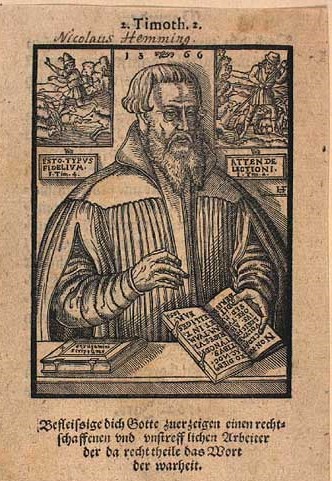Putting the Expert in Context: Niels Hemmingsen and the Ordering of Sixteenth-Century Denmark
Niels Hemmingsen (1513–1600) was an early modern Danish theologian. In my recent book, Envisioning the Christian Society (Mohr Siebeck, 2020), I study Hemmingsen as an expert in his theological and political context. This blog post presents the book.

What is an expert?
Niels Hemmingsen was a professor of theology at the University of Copenhagen from the 1540s onwards, and in this capacity he was an adviser to the king in various matters. Hemmingsen played a key role in moulding Danish society according to the ideas of Lutheranism, and his history is intertwined with the history of the Danish Crown. The sixteenth century saw the rise of a relatively new royal branch on the Danish throne, the House of Oldenburg. During this century, the Oldenburgs became important actors in European politics, and Hemmingsen’s writings became widespread all over Protestant Europe at the same time.
As a professional producer of discourse, Hemmingsen was what the sociology of knowledge has termed an expert. To use the categories of expert and experthood is to say that the way of discussing and solving problems with a certain rhetorical and conceptual toolbox at hand was a strategy of “recultivating the vineyard” (confessionalization in historiographical jargon). However, this does not reflect the notion that confessionalization constitutes a set of rational, political decisions focused on the increase of power. Instead (following Ute Lotz-Heumann), it is a way of putting problems on the agenda and solving them by producing norms of behaviour. Hemmingsen’s method of problem solving was derived from the teaching of the three estates that he inherited from his Lutheran teachers at Wittenberg. I have examined Hemmingsen’s use of the estates in three cases: his understanding of the pastor, his understanding of the king, and his understanding of the financial market.
How does one become an expert?
By completing a long and thorough process of learning, publicly defending disputation theses at two events and observing academic ritual, Hemmingsen had earned the right to be regarded as an expert. Experthood gave him new and important duties under the auspices of the government, but it also provided him with access to an international network of Pan-Protestantism. This was not a formal network, but is the historian’s way to analyse the idea (and those presenting it) proposed in many (but not all) religious cultures of the mid-to-late-sixteenth-century in Christian non-Roman Catholic Europe that the dissensions brought about by Luther’s revolt were not important enough to overshadow the unity of Protestants. With such people as Leipzig printer Ernst Vögelin and English queen Elizabeth I, Hemmingsen shared the idea that true Christian religion had a unifying rather than a dividing potential. However, such irenic thoughts required actual unity, which was never established.
Hemmingsen’s status as an expert might have been regarded as free, but in reality it also had limits. However flexible and adjustable he constantly proved to be, Danish king Frederik II had his concerns about Hemmingsen caused by the complaints about his allegedly not-so-Lutheran views coming from the king’s brother-in-law, Elector August of Saxony, and the Dresden theologians. In 1579 the king suspended Hemmingsen from his office, and he was never reinstated.
Using the “three estates” in discourse
Hemmingsen’s suspension shows that his vision that theological experts were superior to politicians was not feasible, at least not while he also lauded the rule of the king. In this respect, his teaching about the estates was not the solution, but rather the problem. Hemmingsen’s idea that experthood entailed certain privileges could not be realised. Jens Maeße, a sociologist specialising in expertise, claims that an expert is someone who moves across a trans-epistemic field that includes academia, court, media and market. Hemmingsen’s case shows that more often than not, the different epistemes caused difficulties for the expert, since the epistemes did not have the same opportunity to influence each other. What was academically feasible may not have been politically sound, or even possible, and the united interests of market and politics could easily mean that academia lost out. Confronted with an opposing pressure from the different epistemes, Hemmingsen neither could nor would propose a pure three estates teaching. His way of negotiation from case to case turned Luther’s three estates into a volatile discourse that often contradicted itself.
Lutheranism or Lutheranisms?
Hemmingsen’s case suggests that a comparison between confessions is not the only feasible method to answer the question “what was Lutheranism?” There was also, as Thomas Kaufmann has stressed, plurality within Lutheranism – even more so, one could add, if a perspective including more than the German lands is applied. A comparative approach shows that Lutheranism was never one thing. Hemmingsen’s and the Danish branch of Lutheranism was one voice amongst many others, just like Lutheranism in Württemberg or Brandenburg, for instance. The Danish variant of Lutheran Christianity was not equal to what one encountered in the Empire, where there were important regional differences as well. Instead of speaking of early modern Lutheranism, Hemmingsen’s case allows the notion of early modern Lutheranisms.
Mattias Skat Sommer is a Carlsberg Foundation Postdoctoral Researcher at the University of Göttingen. He received his PhD in church history at Aarhus University in 2019. Envisioning the Christian Society is his first book.
